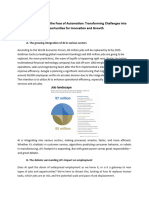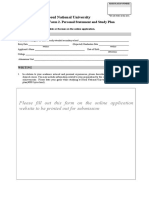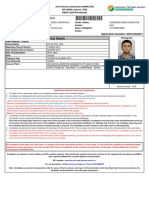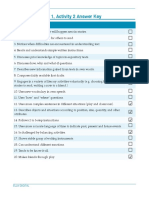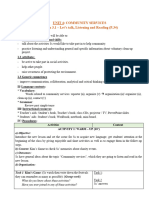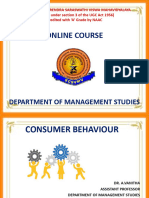9/19/24
MANM519 Week 3
AI, Jobs and the Future of Work
Dr. Erin Chao Ling
chao.ling@surrey.ac.uk
RESEARCH BACKGROUND
Exploring intersections between AI, People and Society
• AI Applications and Implications in Services/Businesses
• AI in Workplace and Workforce
• Human-AI Team Collaboration
• AI in Tourism and Hospitality Management
• Human-Robot/AI Interaction
• AI Adoption and User Behaviour
• Ethical implications of AI adoption and use
Lecturer in AI and the Future of Work
Surrey Institute for People-Centred AI
Surrey Business School
§ AI & jobs landscape
§ The use of AI in the recruitment process
§ Bias and discrimination induced by AI-powered hiring
§ Skills & AI-driven career development
1
� 9/19/24
Optimisation Creativity or Strategy
Repetitive Routine Optimising Complex Creative
Tele-sales Truck driver Radiologist CEO Columnist
Dishwasher Hematologist Reporter M&A Expert Scientist
Customer Support Security Guards Research Analyst Economist Artist
AI AI AI
years
5
S o u rce : K a i-F u L e e : H o w A I ca n sa ve h u m a n ity?
10
years
15
years
SAFE SAFE
New jobs and lost jobs
2023-2027
Source: World Economic Forum, Future of Jobs Survey 2023
2
� 9/19/24
Avatar Robot café DAWN
DAWN Avatar Robot café
‘OriHime pilots’ (staffs)
3
� 9/19/24
By 2030, approximately 85 million jobs could go unfilled
globally because of a lack of applicants with the skills to
take them, which could result in $8.5 trillion in unrealized
annual revenues.
(so u rce : K o rn F e rry a n a lysis)
• Loss of jobs
• Automation of repetitive tasks
• Creation of new jobs
• Changes to the gig economy
• Rise of demand for soft skills
10
10
• Microsoft’s 2023 Work Trend Index highlights that 82% of leaders recognise the pressing need
to prepare their workforce for the expanding AI landscape. Upskilling—enhancing existing
skills—and reskilling—acquiring entirely new capabilities—are emerging as indispensable
strategies.
• Organisations such as Amazon, Ericsson and PwC are heavily investing in upskilling and
reskilling initiatives to build employees’ AI capabilities. E.g., Amazon’s Machine Learning
University equips its employees (regardless of their background) to build machine learning
skills.
• A recent survey (from Korn Ferry) shows 40% of CEOs cite a lack of AI-related knowledge and
within their HR team as the biggest obstacle to AI integration.
S o u rce : B ritish C o u n cil (2 0 2 3 )
11
Skill evolution
2023-2027
Source: World Economic Forum, Future of Jobs Survey 2023
12
4
� 9/19/24
The Global Skills Taxonomy
More level details: https://www1.reskillingrevolution2030.org/skills-taxonomy/index.html
13
§ Adapt skills frameworks
§ Adopt an agile approach to skills gap analysis
§ Foster a continuous learning culture
§ Adapt learning progammes for AI-related upskilling and reskilling
14
AI in Recruitment Processes
15
5
� 9/19/24
Sourcing Screening Assessment Interviewing
quickly deriving the best Offer valuable data to facilitate remote hiring and
finding and connecting with
applicants determ ine the best fit save time
talent quickly
THE USE OF AI IN THE RECRUITMENT PROCESS
16
17
Asynchronous video interview (AVI) platform with an
artificial intelligence (AI) decision agent based on a
TensorFlow convolutional neural network (CNN)
Th e p ro ce ss o f in te rvie w e rs’ ju d gm e n ts to w ard in te rvie w e e s’
co m m u n icatio n skills an d traits in A V I
S u e n , H . Y ., H u n g , K . E ., & L in , C . L . (2 0 2 0 ). In te llig e n t vid e o in te rvie w
a g e n t u se d to p re d ict co m m u n ica tio n skill a n d p e rce ive d p e rso n a lity
tra its. H u m a n -ce n tric C o m p u tin g a n d In fo rm a tio n S cie n ce s , 1 0 , 1 -1 2 .
V id e o d ata p ro ce ssin g, classifie r train in g, an d classifie r valid atio n
18
6
� 9/19/24
What to look for in AI Assessment tools? Roles? Skills?
Personality traits? Evidence-based proof? Human biases risk?
Seamless integration?
Some examples: AssessFirst, Bryq, Cangrade, HireVue, myInterview, nTalents,
PredictiveHire, Pymetrics, Sprockets, Vervoe, Zappyhire
Use psychometrics, Big Five personality traits, hard skills, general competencies,
interpersonal skills assessment, gamification, AI grading…
19
19
Write better job requirements Career path guidance
Candidate personalisation Transparent selection
Increased productivity for new
Large skill pools workers
Tagging – tag unstructured data for Eliminate workload for
words (e.g., capabilities, skills) managers/reviewers
Generative AI & HR process Professional Development
and Performance Review
20
21
7
� 9/19/24
22
BIAS?
\
23
24
8
� 9/19/24
New York City’s Automated Employment Decision Tool law (July 2023):
• Employers who use AI in hiring have to tell candidates they are doing
so and submit to annual independent audits to prove that their
systems are not racist or sexist.
• Candidates will be able to request information from potential
employers about what data is collected and analysed by the
technology.
• Violations will result in fines of up to $1,500.
Recommended reading:
"Calls for AI regulations to protect jobs rise in Europe after ChatGPT’s arrival":
https://www.cnbc.com/2023/10/11/most-europeans-want-government-restrictions-on-ai-says-study.html
25
Only 20% of AI and data
professionals in the UK are
women.
(The Alan Turing Institute, 2021)
Up to £23 million in government
funding will create 2,000
scholarships in AI and data
science in England to boost
skills and diversity in AI jobs.
Where are the WOMEN?
-the power of the question is on us as humans!
26
AI Career Development
• Deep dive into AI impact research
• Career exploration (AI domains and
job opportunities)
• Discover your own unique path and
set goals
• Build knowledge and skills,
upskilling and reskilling
• Lifelong learning
27
9
� 9/19/24
- a range of interpersonal and communication skills that help people function both in their personal life
and at work; typically include the following competencies:
• Problem-solving
• Creativity
• Critical thinking
• Stress management
• Decision-making
• Emotional intelligence (self-awareness, self-discipline,
social skills, relationship management, communication)
‘Analytical judgm ent,’ ‘flexibility,’ and ‘em otional intelligence’ top the list of
skills leaders believe will be essential for em ployees in an AI-powered future
Source: 2023 Work Trend Index: Annual Report
28
- the ability to identify and manage your own emotions and the emotions of others.
- key to setting yourself apart in an AI-driven world.
“The most effective leaders are all alike in one crucial way: they all have
a high degree of what has come to be known as emotional intelligence.
It’s not that IQ and technical skills are irrelevant – they do matter, but
they are the entry-level requirements for executive positions. My
research, along with other recent studies, clearly shows that emotional
intelligence is the sine qua non of leadership. Without it, a person can
have the best training in the world, an incisive, analytical mind, and an
endless supply of smart ideas, but he still won’t make a great leader.”
- Daniel Goleman
Recommended reading: “What Makes a Leader” and “The Rise of AI Makes Emotional Intelligence More Important” from Harvard Business Review
29
Sky News Special Programme: AI Future
h ttp s://n e w s.sky.co m /vid e o /sp e cia l-p ro g ra m m e -a i-fu tu re -
1 2 9 1 7 1 3 9 # :~ :te xt= N e w s% 2 0 % 7 C % 2 0 S ky% 2 0 N e w s-
,S p e cia l% 2 0 p ro g ra m m e % 3 A % 2 0 T h e % 2 0 im p a ct% 2 0 o f% 2 0 A rtificia l% 2 0 In te llig e n ce % 2 0 o n % 2 0 t
h e % 2 0 w o rkfo rce ,g lo b a l% 2 0 ra ce % 2 0 fo r% 2 0 A I% 2 0 su p re m a cy.
30
10
� 9/19/24
AI Skill Assessment: Self-Evaluation
1. Programming and Coding Skills: Python programming, R programming, Other programming languages
2. Machine Learning and Deep Learning: Understanding of machine learning concepts, Practical experience with machine learning
algorithms, Knowledge of deep learning and neural networks
3. Data Analysis and Data Science: Data preprocessing and cleaning, Data visualization, Statistical analysis and hypothesis testing
4. AI Tools and Frameworks: Familiarity with AI libraries and frameworks, Experience with AI development tools
5. Ethical and Regulatory Knowledge: Understanding of AI ethics and bias, Knowledge of AI regulations and compliance
6. Communication and Collaboration: Ability to explain AI concepts to non-technical stakeholders, Collaboration with multidisciplinary teams
7. Lifelong Learning: W illingness and motivation to learn and adapt in the fast-paced field of AI
8. Other Skills: List any additional skills or competencies relevant to AI and employment: Skill 1, Skill 2, Skill 3…
Self-Reflection: Based on your self-assessment, identify two or three skills or areas where you would like to improve. Consider how you
might address these areas through further education, training, or practical experience.
31
1. What are your concerns (as an applicant) about
using AI for job applications? How ready are you
and how are you looking for jobs?
2. How do you attract diverse talent? What are your
concerns (as an employer/decision-maker) about
using AI for recruitment and selection? How are you
addressing unconscious bias in the process?
3. What are your suggestions (as an AI-powered
recruitment tool developer) for trustworthy AI
algorithm development?
4. What are your suggestions (as a government
regulatory body) for making policies and regulations
for the responsible use of recruitment AI?
32
Imagine work in 2033, what would you like AI to deliver?
• How could work change by 2023?
• What would you value most about AI in the workplace?
• What skills will be essential for employees in an AI-powered future?
• What would be your concerns?
33
11
� 9/19/24
THANK YOU!
Any questions?
34
12




